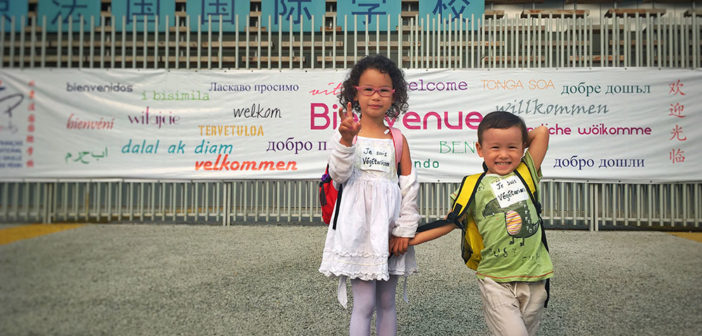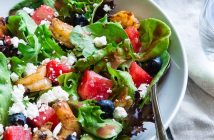“Bye mom!” He took his sister’s hand and got on the bus.
It was me gulping back the tears. I had just bundled my son off for his first year of kindergarten and he just smiled and waved. I waved back but I felt a hollowness in my gut. To be honest, it’s not the separation that had me choked up. Frankly, I’ve been looking forward to having both kids in school. My gulp was mostly about food:
The canteen.
Canteens are notoriously terrible. That doesn’t mean my kids eat terrible food at their school—The French International School of Beijing—and nor is the stereotype of “terrible cafeteria food” fair to apply to every school.
“Mommy, they put chicken on my plate today.”
This was the first sentence from my son’s lips when he returned from the second day. I gulped again.
“What did you do, honey? Did you eat it?” (Breath held.)
“No, I didn’t!” he said. (Sigh of relief.)
My kids have been vegetarian since birth. I chose this lifestyle as a youth myself and have been vegetarian for almost thirty years. It’s a big part of my ethics around environmentalism and health and wellness. And, like every parent, I will impose my ethics on my children until they’re old enough to develop their own and make an informed choice.
The menu at my kids’ school is diverse and creative but just lacks one thing: vegetarian mains, even as one of two options. The school argues that they have enough in the way of accompanying non-meat options like salads, fruit, dairy, and cooked vegetable portions, but I still worry about my kids’ lunchtime protein intake. And, what’s more, I’m not permitted to supplement plant-based protein snacks for my kids.
Another layer worries me: both kids (but particularly my son) are still too young to express their dietary needs clearly—especially in French. Even though I’ve taught my daughter how to say “je ne mange pas la viande,” (I don’t eat meat) I worry she’ll be too shy to say it. And my son’s French is nil.
For these reasons, I taped signs to their shirts for the first few days of school that read, in French: I am vegetarian. I wanted to give them another way to communicate.
So, when I got a call from the school asking me to stop taping signs to my daughter’s shirt, I was surprised. The school nurse explained that her file lacked this information and I was flabbergasted. Based on everything you’ve read in this article so far, can you imagine that I wouldn’t have specified it a million ways already, including in her (their) formal registration(s)? I very calmly responded that, not only had I specified it for both children in multiple ways, but that the signs had been meant as reinforcement, particularly for my 3-year old son. (Thank goodness for the signs!)
What she said next surprised me:
“We worry this will stigmatize her.”
I paused. Will a different diet stigmatize a child? And which is more important: protecting a child against stigmatization or preserving both a child’s health and the health of our planet? [Kids who have never digested meat will have trouble digesting it, and in fact could become quite ill. And in 2016, the government of China committed to reducing meat consumption nationally by 50 percent. Why? To reduce global warming.]
The nurse was sympathetic and assured me they’d received the message. I agreed to stop taping the signs to their shirts. Now I’m just back to holding my breath.
“What did you eat at school today?” I ask regularly.
“Noodles!” said my son this week.
I can only hope there was no beef in the pasta sauce.
Photo: Courtesy of Ember Swift

This article originally appeared in beijingkids’ October 2017 issue.
Download the digital copy here.




